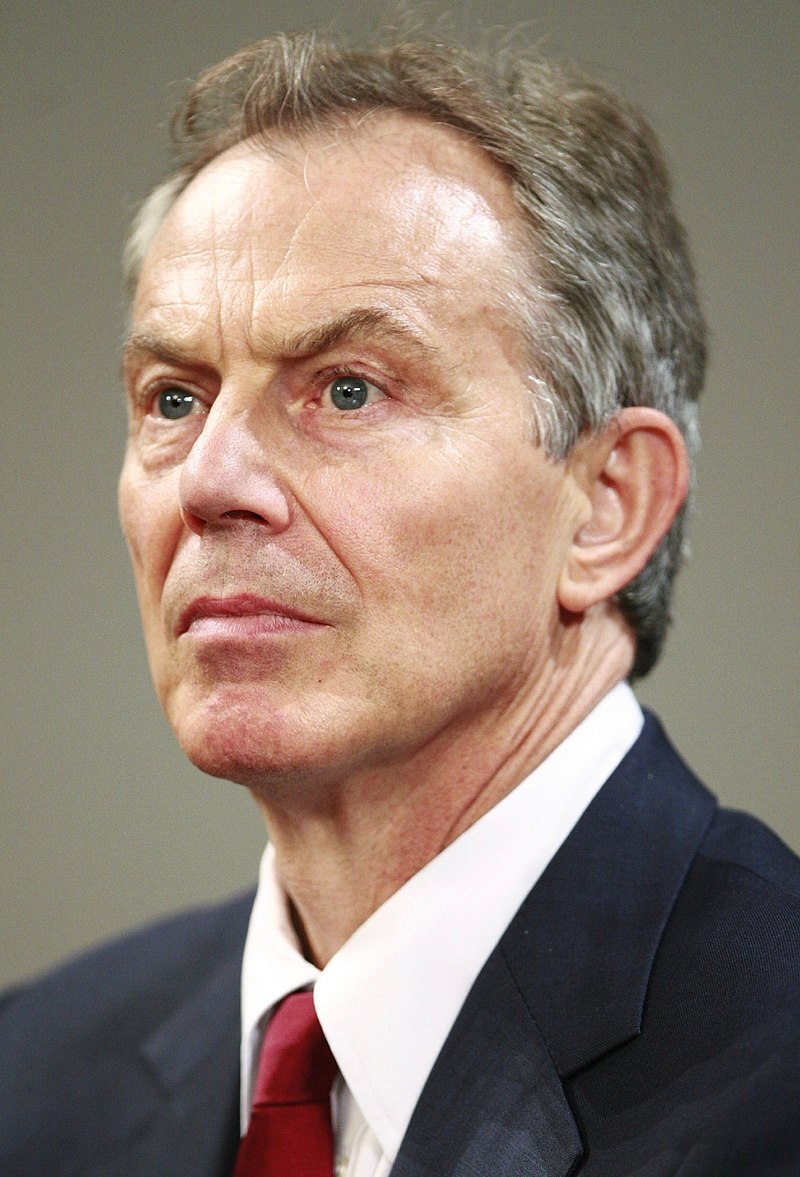Tony Blair is a British politician who served as the Prime Minister of the United Kingdom from 1997 to 2007, representing the Labour Party. Born on May 6, 1953, in Edinburgh, Scotland, Blair attended Oxford University and later became a barrister. He entered Parliament in 1983 and rose through the ranks, eventually becoming the leader of the Labour Party in 1994. Blair’s tenure as Prime Minister was marked by economic prosperity, social reforms, and controversial foreign policy decisions, notably the Iraq War. Post-politics, he has been involved in various global initiatives and diplomatic efforts.
Blair’s early life was marked by his upbringing in a middle-class family in Edinburgh. His father, Leo Blair, was a barrister, and his mother, Hazel Blair, was a homemaker. Blair attended Fettes College, a prestigious private school in Edinburgh, where he excelled academically and developed a passion for politics and public speaking. He went on to study law at St John’s College, Oxford, where he was actively involved in student politics and served as president of the Oxford University Labour Club.
After completing his education, Blair embarked on a legal career, working as a barrister in London. However, his interest in politics remained strong, and he soon became involved in Labour Party activities. In 1983, Blair was elected as the Member of Parliament (MP) for Sedgefield, a constituency in County Durham. His early years in Parliament were marked by his support for Labour leader Neil Kinnock and his advocacy for progressive policies within the party.
Blair’s rise within the Labour Party was swift, and in 1994, following the sudden death of Labour leader John Smith, Blair was elected as the new leader of the party. Under Blair’s leadership, Labour underwent a period of significant reform and rebranding, moving away from its traditional socialist roots and embracing a more centrist and modernized platform known as “New Labour.”
In the 1997 general election, Blair led Labour to a historic landslide victory, ending 18 years of Conservative Party rule. At the age of 44, he became the youngest Prime Minister of the United Kingdom since Lord Liverpool in 1812. Blair’s election marked a new era in British politics, characterized by optimism, energy, and a commitment to social and economic reform.
As Prime Minister, Blair’s government implemented a wide range of domestic policies aimed at modernizing Britain’s economy, improving public services, and promoting social inclusion. One of Blair’s flagship initiatives was the introduction of the National Minimum Wage Act in 1998, which established a minimum wage for workers in the UK for the first time. He also oversaw significant investments in healthcare and education, including the expansion of early childhood education and improvements in NHS services.
Blair’s government also pursued constitutional reforms, including the devolution of powers to Scotland, Wales, and Northern Ireland through the creation of the Scottish Parliament, the Welsh Assembly, and the Northern Ireland Assembly. These reforms aimed to promote greater autonomy and self-governance within the UK’s constituent nations while maintaining the overall unity of the country.
On the international stage, Blair played a prominent role in shaping Britain’s foreign policy and engaging with global challenges. He was a strong advocate for European integration and played a key role in negotiating the Amsterdam Treaty and the Treaty of Nice, which expanded the European Union’s powers and institutions. Blair also worked closely with US President Bill Clinton and later President George W. Bush on issues such as global security, terrorism, and the Middle East peace process.
Blair’s tenure as Prime Minister was not without controversy, particularly regarding his government’s decision to support the United States in the invasion of Iraq in 2003. The decision to join the Iraq War, based on intelligence indicating the presence of weapons of mass destruction (WMDs) in Iraq, was highly divisive and remains a subject of debate and scrutiny to this day. Critics accused Blair of misleading the public and Parliament about the justification for war, leading to widespread protests and criticism of his leadership.
Despite the challenges and controversies, Blair won a second and third term as Prime Minister in the 2001 and 2005 general elections, albeit with reduced majorities. His governments continued to prioritize domestic reforms, including education reform, welfare reform, and efforts to reduce poverty and inequality. Blair also played a leading role in international efforts to address climate change, global poverty, and conflict resolution, earning him recognition as a global statesman and advocate for human rights and development.
Blair stepped down as Prime Minister in 2007 after serving for more than a decade, making way for his successor, Gordon Brown. Following his resignation, Blair remained active in public life as a speaker, author, and consultant, focusing on issues such as global governance, Middle East peace, and interfaith dialogue. He also established the Tony Blair Institute for Global Change, a nonprofit organization dedicated to promoting effective governance, economic development, and conflict resolution worldwide.
In recent years, Blair has continued to be involved in political and public affairs, offering his insights and perspectives on various global challenges and developments. While his legacy remains complex and debated, Blair’s biography reflects his enduring impact on British politics, international relations, and efforts to address pressing global issues.
